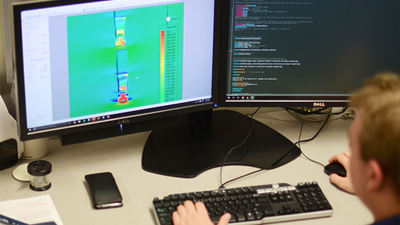 David Bevly, Bill and Lana McNair distinguished professor in Auburn University’s Department of Mechanical Engineering and director of the GPS and Vehicle Dynamics Laboratory, leads a team of graduates students that is continuing research through a Federal Highway Administration grant to develop a drive-assistive truck platooning prototype, with the goal of saving fuel and decreasing traffic congestion while improving safety.
David Bevly, Bill and Lana McNair distinguished professor in Auburn University’s Department of Mechanical Engineering and director of the GPS and Vehicle Dynamics Laboratory, leads a team of graduates students that is continuing research through a Federal Highway Administration grant to develop a drive-assistive truck platooning prototype, with the goal of saving fuel and decreasing traffic congestion while improving safety.
The first phase of developing the prototype included investigating partial automation – such as throttle and braking systems – for truck platooning by integrating vehicle-to-vehicle communications and adaptive cruise control. Combining the communications system with ACC enables the following truck to travel at a close, yet safe, distance to the truck ahead.
The second phase examines how platoons can conserve fuel, therefore reducing costs for fleet companies. Researchers are studying the effects of aerodynamics and engine variables to determine how shipping companies and fleet owners can save fuel, while also maintaining the highest safety standards. “Phase one, we were able to create a functioning product and made sure the system was safe,” said Luke Humphreys, graduate research assistant. “In phase two, we’re trying to determine how we can achieve optimal performance and gain.”
Humphreys has tested several variables to see the effects of the truck platoon at the 1.7-mile track at Auburn’s National Center for Asphalt Technology. From controlling the engine through fuel economy testing to evaluating pressure gradients, Humphreys, and others are hopeful they will create the perfect prototype to put on the market.